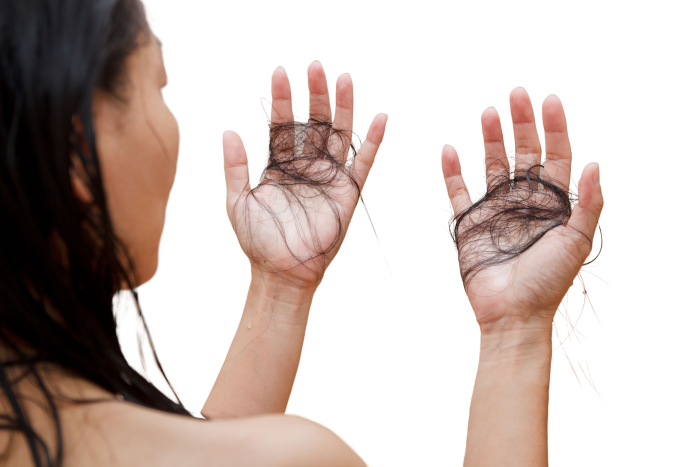Hair loss in women is a very common condition. However, patients struggle to find effective treatments. We understand the frustration of dealing with hair loss. Hair loss can have a profound emotional and psychological impact. It may affect self-esteem, body image, and confidence. At the Trillium Clinic, our solutions are designed to return to you the confidence that comes from a full head of hair. Evaluate all of your options today, and regain the hair you deserve.
What is Female Hair Loss

Female pattern hair loss typically manifests as diffuse thinning of hair rather than a receding hairline or bald spots as seen in male pattern baldness. Hair thinning is commonly observed on the top of the scalp or along the center parting of the hair. The hairline usually remains intact. Female pattern hair loss can occur at any age but is most commonly noticed during menopause or post-menopause. However, it can also start as early as the teenage years or in young adulthood.
What Causes Hair Loss in Women
Androgenic alopecia in women is primarily influenced by genetic and hormonal factors. It is believed that both genetic predisposition and the influence of androgen hormones, specifically dihydrotestosterone (DHT), play a role. DHT can cause hair follicles to shrink, resulting in shorter, finer hair growth over time. While genetics and hormones play a significant role, other factors such as aging, changes in hormone levels (e.g., menopause), certain medical conditions (e.g., polycystic ovary syndrome), and medications can contribute to or exacerbate androgenic alopecia in women.
How is Hair Loss in Women treated
Lifestyle changes: Maintaining a healthy lifestyle, including a balanced diet, regular exercise, stress management, and avoiding damaging hair practices (e.g., excessive heat styling or tight hairstyles), can support overall hair health.
Topical minoxidil: Over-the-counter minoxidil (Rogaine) is commonly used to promote hair regrowth in women. It is applied directly to the scalp and may help slow down hair thinning and stimulate hair growth.
Prescription medications: In some cases, healthcare professionals may prescribe medications such as anti-androgens or low-dose oral contraceptives to help manage hair loss by counteracting the effects of androgens on the hair follicles.
Platelet-Rich Plasma (PRP): PRP for hair loss is a regenerative treatment that utilizes the patient’s own blood to stimulate hair growth. The procedure involves extracting a small amount of blood from the patient, processing it to concentrate the platelets and growth factors, and then injecting the PRP solution into the scalp. The platelets and growth factors in PRP promote the regeneration of hair follicles, improve blood circulation to the scalp, and stimulate the production of new, thicker hair strands. PRP for hair loss is a non-surgical, minimally invasive procedure that has shown promising results in promoting hair growth and improving hair density. Multiple treatment sessions are usually recommended for optimal results.
Hair transplant surgery: In more severe cases, hair transplant surgery may be an option. This procedure involves transferring hair follicles from areas with healthy hair growth to areas of thinning or baldness.
Embark on your journey to radiant skin
Remember, androgenic alopecia is a common condition that affects many women. While it may cause changes in your physical appearance, it does not define your worth or value as an individual. Seeking support, taking proactive steps to manage hair loss, and focusing on overall well-being can help you navigate androgenic alopecia with confidence. If you are a woman suffering from hair loss make an appointment here to see one of the providers at the Trillium Clinic in Chapel Hill. We specialize in treating female hair loss. We will provide a comprehensive scalp evaluation and determine if an underlying condition is contributing to the hair loss. At the conclusion of the evaluation, a personalized treatment plan will be presented. We are currently taking new patients from Chapel Hill, Carrboro, Hillsborough, Pittsboro, Mebane, Durham, Burlington, Cary, and surrounding cities, who suffer from hair loss, call us today to discuss appropriate treatment options, including PRP, to regrow your hair.

